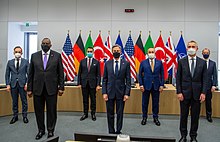Heiko Maas
[5] Maas was born on 19 September 1966 to a Catholic, middle class family in Saarlouis, a city near the French border that is named for Louis XIV of France.
[12] Following the 2013 federal elections, Maas was part of the SPD team in the negotiations with the CDU/CSU on a coalition agreement; he was a member of the energy policy working group led by Peter Altmaier and Hannelore Kraft.
[14] In June 2017, Maas disclosed to the Bild newspaper that he was the recent recipient of an unprecedented number of death threats including a bullet casing in the mailbox of his private residence.
After taking office as foreign minister in 2018, Maas was markedly tougher than his immediate predecessors – Frank-Walter Steinmeier and Sigmar Gabriel – in his rhetoric and approach towards Russia.
[29] In November 2018, Maas raised the issue of Xinjiang internment camps and human rights abuses against the Uyghurs in a meeting with Chinese Vice Premier Liu He.
[30] Regarding the Yemeni Civil War, Maas told Spiegel Online: "In Yemen, an unprecedented humanitarian tragedy is unfolding before the eyes of the international community...The call from Mike Pompeo and James Mattis for a ceasefire and the resumption of talks comes at the right time.
[34] On 3 January 2020, the high-level Iranian General, Qasem Soleimani, was assassinated by the United States, which considerably heightened the existing tensions between the two countries.
[36] Following the Galwan Valley clash between Indian and Chinese troops, Maas urged China and India to de-escalate tensions to avoid a major conflict.
"[39] Maas expressed deep concern over the escalation of hostilities in the disputed region of Nagorno-Karabakh and called on Armenia and Azerbaijan to immediately halt fighting and progress towards a peaceful resolution.
He had "made clear that politics that concern the country of Thailand can’t be conducted from German soil" and if there are things that are considered to be illegal, it will have "immediate consequences.
"[41] President Trump said in his speech to the UN General Assembly on 24 September 2018 that Germany will "become totally dependent on Russian energy if it doesn't change course immediately".
"[43] In early 2015, Maas successfully introduced a new law meant to mitigate radical Islamist attacks, by making it a criminal offence to travel abroad to receive military training.
[44] Shortly after, he and Interior Minister Thomas de Maizière (CDU) jointly submitted a draft law permitting the temporary retention of internet and telephone data – excluding e-mail traffic – to aid criminal investigations.
[45] In July 2015, Maas announced plans to amend Germany's penal code on sexual assault in accordance with the Istanbul Convention of the Council of Europe; the reform is to punish abuse which exploits a victim's fear of a "perceived menace" and tighten sentences in rape cases.
"[48] In 2015, he endorsed criticism expressed by Federation of German Consumer Organizations (VzBz) which held that Facebook’s data protection terms were too vague.
[50] After the Netzpolitik scandal in 2015, where a German language blog leaked top secret documents, Maas proposed new legislation called 'Data Stolen Goods'.






